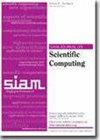Bounds on Nonlinear Errors for Variance Computation with Stochastic Rounding
IF 2.6
2区 数学
Q1 MATHEMATICS, APPLIED
引用次数: 0
Abstract
SIAM Journal on Scientific Computing, Volume 46, Issue 5, Page B579-B599, October 2024.Abstract. The main objective of this work is to investigate nonlinear errors and pairwise summation using stochastic rounding (SR) in variance computation algorithms. We estimate the forward error of computations under SR through two methods: the first is based on a bound of the variance and the Bienaymé–Chebyshev inequality, while the second is based on martingales and the Azuma–Hoeffding inequality. The study shows that for pairwise summation, using SR results in a probabilistic bound of the forward error proportional to [math] rather than the deterministic bound in [math] when using the default rounding mode. We examine two algorithms that compute the variance, one called “textbook” and the other “two-pass,” which both exhibit nonlinear errors. Using the two methods mentioned above, we show that the forward errors of these algorithms have probabilistic bounds under SR in [math] instead of [math] for the deterministic bounds. We show that this advantage holds using pairwise summation for both textbook and two-pass, with probabilistic bounds of the forward error proportional to [math]. Reproducibility of computational results. This paper has been awarded the “SIAM Reproducibility Badge: Code and data available” as recognition that the authors have followed reproducibility principles valued by SISC and the scientific computing community. Code and data that allow the reader to reproduce the results in this paper are available at https://github.com/verificarlo/sr-non-linear-bounds and in the supplementary material (sr-non-linear-bounds-main.zip [8.62KB]).
随机舍入方差计算的非线性误差限值
SIAM 科学计算期刊》,第 46 卷第 5 期,第 B579-B599 页,2024 年 10 月。 摘要这项工作的主要目的是研究方差计算算法中使用随机舍入(SR)的非线性误差和成对求和。我们通过两种方法估算了 SR 条件下计算的前向误差:第一种方法基于方差约束和 Bienaymé-Chebyshev 不等式,第二种方法基于马氏不等式和 Azuma-Hoeffding 不等式。研究表明,对于成对求和,在使用默认舍入模式时,使用 SR 可以得到与[math]成比例的前向误差概率约束,而不是[math]中的确定性约束。我们研究了两种计算方差的算法,一种称为 "教科书式",另一种称为 "双通式",这两种算法都表现出非线性误差。利用上述两种方法,我们证明了这些算法的前向误差在[math]的 SR 下具有概率边界,而不是[math]的确定性边界。我们证明了这一优势在教科书算法和双程算法中使用成对求和时都是成立的,前向误差的概率边界与[math]成正比。计算结果的可重复性。本文被授予 "SIAM 可重现徽章":代码和数据可用",以表彰作者遵循了 SISC 和科学计算界重视的可重现性原则。读者可以通过 https://github.com/verificarlo/sr-non-linear-bounds 和补充材料(sr-non-linear-bounds-main.zip [8.62KB])中的代码和数据重现本文的结果。
本文章由计算机程序翻译,如有差异,请以英文原文为准。
求助全文
约1分钟内获得全文
求助全文
来源期刊
CiteScore
5.50
自引率
3.20%
发文量
209
审稿时长
1 months
期刊介绍:
The purpose of SIAM Journal on Scientific Computing (SISC) is to advance computational methods for solving scientific and engineering problems.
SISC papers are classified into three categories:
1. Methods and Algorithms for Scientific Computing: Papers in this category may include theoretical analysis, provided that the relevance to applications in science and engineering is demonstrated. They should contain meaningful computational results and theoretical results or strong heuristics supporting the performance of new algorithms.
2. Computational Methods in Science and Engineering: Papers in this section will typically describe novel methodologies for solving a specific problem in computational science or engineering. They should contain enough information about the application to orient other computational scientists but should omit details of interest mainly to the applications specialist.
3. Software and High-Performance Computing: Papers in this category should concern the novel design and development of computational methods and high-quality software, parallel algorithms, high-performance computing issues, new architectures, data analysis, or visualization. The primary focus should be on computational methods that have potentially large impact for an important class of scientific or engineering problems.

 求助内容:
求助内容: 应助结果提醒方式:
应助结果提醒方式:


